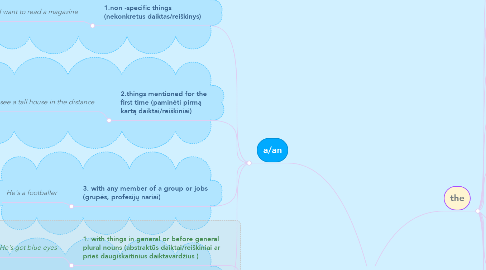
1. a/an
1.1. 1.non -specific things (nekonkretus daiktas/reiškinys)
1.1.1. I want to read a magazine
1.2. 2.things mentioned for the first time (paminėti pirmą kartą daiktai/reiškiniai)
1.2.1. I can see a tall house in the distance
1.3. 3. with any member of a group or jobs (grupės, profesijų nariai)
1.3.1. He's a footballer
1.4. 4. to express each or per (norint pasakyti į/per (dieną/savaitę ir t.t.))
1.4.1. My father eats three eggs a day
2. no article
2.1. 1. with things in general or before general plural nouns (abstraktūs daiktai/reiškiniai ar prieš daugiskaitinius daiktavardžius )
2.1.1. He's got blue eyes
2.2. 2. with abstract nouns (su daiktavardžiais, kurie nurodo abstrakčius dalykus)
2.2.1. love, hatred, impression,
2.3. 3. with uncountable nouns (su neskaičiuotiniais daiktavardžiais)
2.3.1. fish, water, cheese, scissors
2.4. 4. with most countries, towns, streets, lakes, mountains, continents and islands
2.4.1. France, Paris, Church Road, Laisves avenue, Lake Titicaca
2.5. 5. with languages and nationalities
2.5.1. Chinese, Japanese, Lithuanian, Russian, Italian, American
3. the
3.1. 1. specific things (konkretūs daiktai/reiškiniai)
3.1.1. I want to read the magazine on the table
3.2. 2. things that have been mentioned (prieš tai paminėti daiktai/reiškiniai)
3.2.1. I can see a tall house in the distance. The house is red.
3.3. 3. only one of something (vienetiniai daiktai/reiškiniai ir t.t. )
3.3.1. The Prime Minister, the Queen, the King, the sun, the moon, the earth, the sky, the ground, the universe, the weather, the capital etc.
3.4. 4. superlative adjectives (su aukštesniojo laipsnio būdvardžiais)
3.4.1. the fastest, the most interesting, the best, the slowest etc.
3.5. 5.general statement about all the things referred to by that noun (abstraktus teiginys apie visus daiktus/reiškinius ir t.t. nurodytus tuo daiktavardžiu)
3.5.1. Scientists believe that the woolly mammoth became extinct because of climate change.
3.6. 6.adjectives like wealthy, unemployed, disabled, to talk about groups of people who share a characteristic (su būdvardžiais, kurie nurodo į tam tikrą bruožą turinčius žmones, pvz.: turtingieji, bedarbiai, neįgalieji)
3.6.1. the wealthy, the rich, the unemployed, the disabled
3.7. 7.countries what include words kingdom, states, republic (šalys kurių pavadinime yra žodžiai kingdom, states, republic)
3.7.1. The Republic of Lithuania, The UK, the USA,
3.8. 8. The countries and islands that have plural nouns (šalys ir salos kurios vartojamos daugiskaitos forma)
3.8.1. the Maldives, the Orkneys
3.9. 9.rivers, seas, oceans, canals, forests, deserts, gulfs, peninsulas, geographical areas (upės, jūros, vandenynai, kanalai, miškai, dykumos, srovės, pusiasaliai, geografinės sritys)
3.9.1. the Neris, the Nile, the Alps, the Lake District, the Black Forest
3.10. 10. the names of hotels, famous buildings and organisations (viešbučių pavadinimai, žymus pastatai, organizacijos)
3.10.1. the Hilton Hotel, the United Nations
3.11. 11. families (šeimos - pavardės)
3.11.1. the Smiths, the WIlsons etc.
